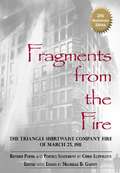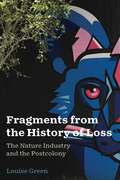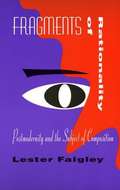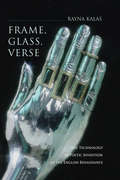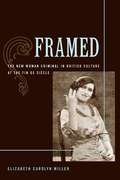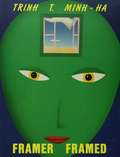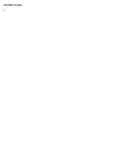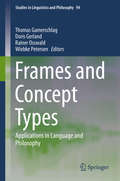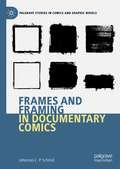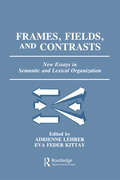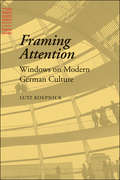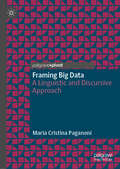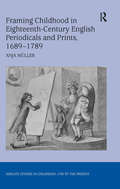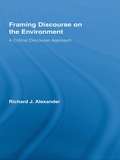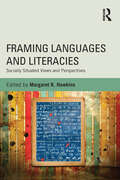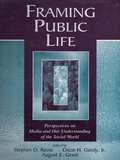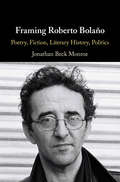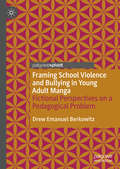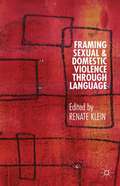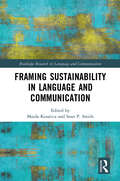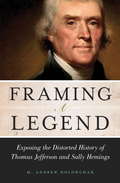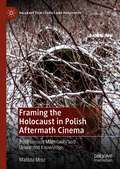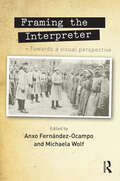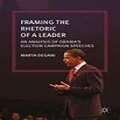- Table View
- List View
Fragments from the Fire: The Triangle Shirtwaist Company Fire of March 25, 1911
by Chris Llewellyn Michelle GaffeyThe Triangle Shirtwaist Company manufactured blouses for women and was located on the eighth, ninth, and tenth floors of the Asch Building, at the corner of Washington Place and Greene Street, in New York City's Washington Square.The company employed up to 900 workers at a time, but on March 25, 1911, only about 500 were present. These were immigrants, most of whom could not speak the English language. Nearly all were female, primarily Russian or Italian, although twelve nationalities were known to be ''on the books.'' At about 4:45 p.m., just after pay envelopes had been distributed, a fire broke out. Not everyone was able to reach the elevators and stairways. On the ninth floor, because the bosses had kept the doors locked to keep out union organizers, workers were forced to jump from windows. One hundred forty-six people, some as young as fourteen, perished. In 1987, Chris Llewellyn chronicled the Triangle Fire and its aftermath in her award-winning, polyvocal book of poems, Fragments from the Fire. Now, 105 years after the Fire, Fragments is in print once again. With poetic and documentary impulses, Fragments speaks to the deplorable working conditions that characterize the garment industry in this new millennium as it continues to commemorate the Triangle Fire of March 25, 1911. Winner of the Walt Whitman Award for 1986, this is a revised 30th anniversary edition of that book which was originally published by Viking Press in 1987 and again in "Steam Dummy & Fragments from the Fire" by Bottom Dog Press in 1993.
Fragments from the History of Loss: The Nature Industry and the Postcolony (AnthropoScene)
by Louise GreenThe Anthropocene’s urgent message about imminent disaster invites us to forget about history and to focus on the present as it careens into an unthinkable future. To counter this, Louise Green engages with the theoretical framing of nature in concepts such as the “Anthropocene,” “the great acceleration,” and “rewilding” in order to explore what the philosophy of nature in the era of climate change might look like from postcolonial Africa.Utilizing a practice of reading developed in the Frankfurt school, Green rearranges narrative fragments from the “global nature industry,” which subjugates all aspects of nature to the logic of capitalist production, in order to disrupt preconceived notions and habitual ways of thinking about how we inhabit the Anthropocene. Examining climate change through the details of everyday life, particularly the history of conspicuous consumption and the exploitation of Africa, she surfaces the myths and fantasies that have brought the world to its current ecological crisis and that continue to shape the narratives through which it is understood. Beginning with African rainforest exhibits in New York and Cornwall, Green discusses how these representations of the climate catastrophe fail to acknowledge the unequal pace at which humans consume and continue to replicate imperial narratives about Africa. Examining this history and climate change through the lens of South Africa’s entry into capitalist modernity, Green argues that the Anthropocene redirects attention away from the real problem, which is not human’s relation with nature, but people’s relations with each other.A sophisticated, carefully argued call to rethink how we approach relationships between and among humans and the world in which we live, Fragments from the History of Loss is a challenge to both the current era and the scholarly conversation about the Anthropocene.
Fragments from the History of Loss: The Nature Industry and the Postcolony (AnthropoScene: The SLSA Book Series #5)
by Louise GreenThe Anthropocene’s urgent message about imminent disaster invites us to forget about history and to focus on the present as it careens into an unthinkable future. To counter this, Louise Green engages with the theoretical framing of nature in concepts such as the "Anthropocene," "the great acceleration," and "rewilding" in order to explore what the philosophy of nature in the era of climate change might look like from postcolonial Africa.Utilizing a practice of reading developed in the Frankfurt school, Green rearranges narrative fragments from the "global nature industry," which subjugates all aspects of nature to the logic of capitalist production, in order to disrupt preconceived notions and habitual ways of thinking about how we inhabit the Anthropocene. Examining climate change through the details of everyday life, particularly the history of conspicuous consumption and the exploitation of Africa, she surfaces the myths and fantasies that have brought the world to its current ecological crisis and that continue to shape the narratives through which it is understood. Beginning with African rainforest exhibits in New York and Cornwall, Green discusses how these representations of the climate catastrophe fail to acknowledge the unequal pace at which humans consume and continue to replicate imperial narratives about Africa. Examining this history and climate change through the lens of South Africa’s entry into capitalist modernity, Green argues that the Anthropocene redirects attention away from the real problem, which is not human’s relation with nature, but people’s relations with each other.A sophisticated, carefully argued call to rethink how we approach relationships between and among humans and the world in which we live, Fragments from the History of Loss is a challenge to both the current era and the scholarly conversation about the Anthropocene.
Fragments of Rationality: Postmodernity and the Subject of Composition
by Lester FaigleyAn insightful assessment of the study and teaching of writing against the larger theoretical, political and technological upheavals of the past 30 years.
Frame, Glass, Verse: The Technology of Poetic Invention in the English Renaissance
by Rayna KalasIn a book that draws attention to some of our most familiar and unquestioned habits of thought—from "framing" to "perspective" to "reflection"—Rayna Kalas suggests that metaphors of the poetic imagination were once distinctly material and technical in character. Kalas explores the visual culture of the English Renaissance by way of the poetic image, showing that English writers avoided charges of idolatry and fancy through conceits that were visual, but not pictorial. Frames, mirrors, and windows have been pervasive and enduring metaphors for texts from classical antiquity to modernity; as a result, those metaphors seem universally to emphasize the mimetic function of language, dividing reality from the text that represents it. This book dissociates those metaphors from their earlier and later formulations in order to demonstrate that figurative language was material in translating signs and images out of a sacred and iconic context and into an aesthetic and representational one. Reading specific poetic images—in works by Spenser, Shakespeare, Gascoigne, Bacon, and Nashe—together with material innovations in frames and glass, Kalas reveals both the immanence and the agency of figurative language in the early modern period.Frame, Glass, Verse shows, finally, how this earlier understanding of poetic language has been obscured by a modern idea of framing that has structured our apprehension of works of art, concepts, and even historical periods. Kalas presents archival research in the history of frames, mirrors, windows, lenses, and reliquaries that will be of interest to art historians, cultural theorists, historians of science, and literary critics alike. Throughout Frame, Glass, Verse, she challenges readers to rethink the relationship of poetry to technology.
Framed: The New Woman Criminal in British Culture at the Fin de Siecle
by Elizabeth Carolyn MillerFramed uses fin de siècle British crime narrative to pose a highly interesting question: why do female criminal characters tend to be alluring and appealing while fictional male criminals of the era are unsympathetic or even grotesque? In this elegantly argued study, Elizabeth Carolyn Miller addresses this question, examining popular literary and cinematic culture from roughly 1880 to 1914 to shed light on an otherwise overlooked social and cultural type: the conspicuously glamorous New Woman criminal. In so doing, she breaks with the many Foucauldian studies of crime to emphasize the genuinely subversive aspects of these popular female figures. Drawing on a rich body of archival material, Miller argues that the New Woman Criminal exploited iconic elements of late nineteenth- and early twentieth-century commodity culture, including cosmetics and clothing, to fashion an illicit identity that enabled her to subvert legal authority in both the public and the private spheres.
Framer Framed: Film Scripts and Interviews
by Trinh T. Minh-haFramer Framed brings together for the first time the scripts and detailed visuals of three of Trinh Minh-ha's provocative films: Reassemblage, Naked Spaces--Living is Round, and Surname Viet Given Name Nam.
Frames Of Mind: A Rhetorical Reader With Occasions For Writing
by Robert DiYanni Pat C. HoyThe first full-color rhetorical reader with an integrated CD-ROM, FRAMES OF MIND: A RHETORICAL READER WITH OCCASIONS FOR WRITING treats the traditional rhetorical patterns not only as methods for effective writing, but as frames for critical thinking.
Frames and Concept Types
by Thomas Gamerschlag Doris Gerland Rainer Osswald Wiebke PetersenThis volume showcases the potential richness of frame representations. The presentation includes introductory articles on the application of frames to linguistics and philosophy of science, offering readers the tools to conduct the interdisciplinary investigation of concepts that frames allow. * Introductory articles on the application of frames to linguistics and philosophy of science * Frame analysis of changes in scientific concepts * Event frames and lexical decomposition * Properties, frame attributes and adjectives * Frames in concept composition * Nominal concept types and determination "This volume deals with frame representations and their relations to concept types in linguistics and philosophy of science. It aims at reviving concepts and frames as a common model across disciplines for representing semantic and conceptual knowledge. Departing from the general assumption that frames are not just an arbitrary format of representation but essential to human cognition, a number of case studies apply frames as an analytical tool to a wide range of phenomena, from changes in scientific concepts to particular linguistic phenomena. This provides new insights into long-standing semantic issues, such as the lexical representation of verbs (as predicative frames specifying particular event descriptions or situation types and their participants), adjectives and nominals (as concept frames, which provide attributes and properties of an entity), as well as modification, complementation, possessive constructions, compounding, nominal concept types, determination, or definiteness marking. " Bert Gehrke, Pompeu, Fabra University, Barcelona, Spain
Frames and Framing in Documentary Comics (Palgrave Studies in Comics and Graphic Novels)
by Johannes C.P. SchmidFrames and Framing in Documentary Comics explores how graphic narratives reframe global crises while also interrogating practices of fact-finding. An analog print phenomenon in an era shaped by digitalization, documentary comics formulates a distinct counterapproach to conventional journalism. In what ways are ‘facts’ being presented and framed? What is documentary honesty in a world of fake news and post-truth politics? How can the stories of marginalized peoples and neglected crises be told? The author investigates documentary comics in its unique relationship to framing: graphic narratives are essentially shaped by a reciprocal relationship between the manifest frames on the page and the attention to the cognitive frames that they generate. To account for both the textuality of comics and its strategic use as rhetoric, the author combines theories of framing analysis and cognitive narratology with comics studies and its attention toward the medium’s visual frames.
Frames, Fields, and Contrasts: New Essays in Semantic and Lexical Organization
by Adrienne Lehrer Eva Feder KuttayRecently, there has been a surge of interest in the lexicon. The demand for a fuller and more adequate understanding of lexical meaning required by developments in computational linguistics, artificial intelligence, and cognitive science has stimulated a refocused interest in linguistics, psychology, and philosophy. Different disciplines have studied lexical structure from their own vantage points, and because scholars have only intermittently communicated across disciplines, there has been little recognition that there is a common subject matter. The conference on which this volume is based brought together interested thinkers across the disciplines of linguistics, philosophy, psychology, and computer science to exchange ideas, discuss a range of questions and approaches to the topic, consider alternative research strategies and methodologies, and formulate interdisciplinary hypotheses concerning lexical organization. The essay subjects discussed include: * alternative and complementary conceptions of the structure of the lexicon, * the nature of semantic relations and of polysemy, * the relation between meanings, concepts, and lexical organization, * critiques of truth-semantics and referential theories of meaning, * computational accounts of lexical information and structure, and * the advantages of thinking of the lexicon as ordered.
Framing Attention: Windows on Modern German Culture (Parallax: Re-visions of Culture and Society)
by Lutz KoepnickIn Framing Attention, Lutz Koepnick explores different concepts of the window—in both a literal and a figurative sense—as manifested in various visual forms in German culture from the nineteenth century to the present. He offers a new interpretation of how evolving ways of seeing have characterized and defined modernity.Koepnick examines the role and representation of window frames in modern German culture—in painting, photography, architecture, and literature, on the stage and in public transportation systems, on the film screen and on television. He presents such frames as interfaces that negotiate competing visions of past and present, body and community, attentiveness and distraction. From Adolph Menzel's window paintings of the 1840s to Nam June Paik's experiments with television screens, from Richard Wagner's retooling of the proscenium stage to Adolf Hitler's use of a window as a means of political self-promotion, Framing Attention offers a theoretically incisive understanding of how windows shape and reframe the way we see the world around us and our place within it.
Framing Big Data: A Linguistic and Discursive Approach
by Maria Cristina PaganoniThis book addresses big data as a socio-technical construct with huge potential for innovation in key sectors such as healthcare, government and business. Big data and its increasingly widespread use in such influential spheres can generate ethically controversial decisions, including questions surrounding privacy, consent and accountability. This book attempts to unpack the epistemological implications of the term ‘big data’, as well as the opportunities and responsibilities which come with it. The author analyses the linguistic texture of the big data narrative in the news media, in healthcare and in EU law on data protection, in order to contribute to its understanding from the critical perspective of language studies. The result is a study which will be of interest to students and scholars working in the digital humanities, corpus linguistics, and discourse studies.
Framing Childhood in Eighteenth-Century English Periodicals and Prints, 1689–1789 (Studies in Childhood, 1700 to the Present)
by Anja MüllerShedding light on an important and neglected topic in childhood studies, Anja Müller interrogates how different concepts of childhood proliferated and were construed in several important eighteenth-century periodicals and satirical prints. Müller focuses on The Tatler, The Spectator, The Guardian, The Female Tatler, and The Female Spectator, arguing that these periodicals contributed significantly to the construction, development, and popularization of childhood concepts that provided the basis for later ideas such as the 'Romantic child'. Informed by the theoretical concept of 'framing', by which certain concepts of childhood are accepted as legitimate while others are excluded, Framing Childhood analyses the textual and graphic constructions of the child's body, educational debates, how the shift from genealogical to affective bonding affected conceptions of parent-child relations, and how prints employed child figures as focalizers in their representations of public scenes. In examining links between text and image, Müller uncovers the role these media played in the genealogy of childhood before the 1790s, offering a re-visioning of the myth that situates the origin of childhood in late eighteenth-century England.
Framing Discourse on the Environment: A Critical Discourse Approach (Routledge Critical Studies in Discourse)
by Richard AlexanderIn this study, Richard Alexander presents a series of original and empirically based case studies of the language and discourse involved in the discussion of environmental and ecological issues. Relying upon a variety of different text types and genres – including company websites, advertisements, press articles, speeches and lectures – Alexander interrogates how in the media, press, corporate and activist circles language is employed to argue for and propagate selected positions on the growing ecological crisis. For example, he asks: How are ecological and environmental concerns articulated in texts? What do we learn about ecological ‘problems’ through texts from differing sources? What language features accompany ecological discourse in differing contexts and registers? Attention is especially directed at where this discourse comes into contact with business, economic and political concerns.
Framing Languages and Literacies: Socially Situated Views and Perspectives
by Margaret R. HawkinsIn this seminal volume leading language and literacy scholars clearly articulate and explicate major social perspectives and approaches in the fields of language and literacy studies. Each approach draws on distinct bodies of literature and traditions and uses distinct identifiers, labels, and constellations of concepts; each has been taken up across diverse global contexts and is used as rationale and guide for the design of research and of educational policies and practices. Authors discuss the genesis and historical trajectory of the approach with which they are associated; offer their unique perspectives, rationales, and engagements; and investigate implications for understanding language and literacy use in and out of schools. The premise of the book is that understanding concepts, perspectives, and approaches requires knowing the context in which they were created, the rationale or purpose in creating them, and how they have been taken up and applied in communities of practice. Accessible yet theoretically rich, this volume is indispensible for researchers, students, and professionals across the fields of language and literacy studies.
Framing Public Life: Perspectives on Media and Our Understanding of the Social World (Routledge Communication Series)
by Jr. August E. Grant Stephen D. Reese Oscar H. GandyThis distinctive volume offers a thorough examination of the ways in which meaning comes to be shaped. Editors Stephen Reese, Oscar Gandy, and August Grant employ an interdisciplinary approach to the study of conceptualizing and examining media. They illustrate how texts and those who provide them powerfully shape, or "frame," our social worlds and thus affect our public life. Embracing qualitative and quantitative, visual and verbal, and psychological and sociological perspectives, this book helps media consumers develop a multi-faceted understanding of media power, especially in the realm of news and public affairs.
Framing Roberto Bolaño: Poetry, Fiction, Literary History, Politics
by Jonathan Beck MonroePoetry, fiction, literary history, and politics. These four cornerstone concerns of Roberto Bolaño's work have established him as a representative, generational figure in not only Chile, Mexico, and Spain, the three principal locations of his life and work, but throughout Europe and the Americas, increasingly on a global scale. At the heart of Bolaño's 'poemas-novela', his poet- and poetry-centered novels, is the history and legacy of the prose poem. Challenging the policing of boundaries between verse and prose, poetry and fiction, the literary and the non-literary, the aesthetic and the political, his prose poem novels offer a sustained literary history by other means, a pivotal intervention that restores poetry and literature to full capacity. Framing Roberto Bolaño is one of the first books to trace the full arc and development of Bolaño's work from the beginning to the end of his career.
Framing School Violence and Bullying in Young Adult Manga: Fictional Perspectives on a Pedagogical Problem
by Drew Emanuel BerkowitzThis book closely examines the ways in which many popular, internationally-published Japanese young adult manga graphic novel titles frame instances of K-12 school-situated violence and bullying. Manga is a Japanese literary medium that has grown worldwide as an increasingly visible fixture of young adults’ recreational reading habits. The author uncovers the medium’s most prevalent patterns of defining, depicting, and discussing school-situated violence and bullying. Through the lens of socio-cultural media frame analysis, he explores what these patterns might indicate about young adults' preexisting views and beliefs about occurrences of violence and bullying within their own school environments. This in-depth investigation of manga literature provides important information pertaining to the pedagogies and practices of K-12 teachers and school administrators, as well as detailed advice for parents of young adult manga fans.
Framing Sexual and Domestic Violence through Language
by Renate KleinWith examples from throughout Europe and the United States, the contributors to this volume explore how gender violence is framed through language and what this means for research and policy. Language shapes responses to abuse and approaches to perpetrators and interfaces with national debates about gender, violence, and social change.
Framing Sustainability in Language and Communication (Routledge Research in Language and Communication)
by Maida Kosatica Sean P. SmithThis collection brings together established and emerging scholars for a critical framing of sustainability through the lens of language and communication, social semiotics, and media studies. The volume underscores the importance of re-envisioning sustainability around not only climate change and biodiversity loss but in broader systems of ecological, social, and economic imbalances on a global scale.The book begins with a visual essay which provides a semiotic foundation for understandings of sustainability across disciplinary approaches in the chapters that follow. Subsequent chapters are organized around four thematic parts: reframing sustainability in a colonial world; the semiotics of sustainability; communicating sustainability in everyday life; and sustainability communication in the arts. A closing commentary by Crispin Thurlow offers critical reflections on sustainability within language and communication research and beyond.This book will be of interest to scholars addressing sustainability across diverse disciplines, including language and communication, social semiotics, linguistic anthropology, environmental communication, media studies, and development studies.
Framing a Legend
by M. Andrew HolowchakA penetrating critical perspective on the question of Thomas Jefferson's paternity that will make you rethink recent conventional wisdom. It is accepted by most scholars that Jefferson had a lengthy affair with his slave Sally Hemings and fathered at least one of her children, a conclusion based on a 1998 DNA study published in Nature and on the work of historian Annette Gordon-Reed. Framing a Legend argues compellingly that the DNA evidence is inconclusive and that there are remarkable flaws in the leading historical scholarship purporting to show such a liaison. It critically examines well-known books by Fawn Brodie, Annette Gordon-Reed, and Andrew Burstein. Among other defects in these authors' works, Holowchak notes selective use of evidence, ungrounded speculation, tendentious psychologizing, and unpersuasive argumentation. He delves into what we know about Thomas Jefferson's character by showing that the historical facts do not suggest any romantic interest on Jefferson's part in his female slaves. Turning to the genetic evidence, Holowchak points out that, though DNA analysis indicates the presence of a Y-chromosome from some Jefferson male in the Hemings family line, it is unwarranted to conclude that this must have come from Thomas Jefferson. Finally, he discusses Jefferson's racial attitudes and says that they argue against any liaison with Sally Hemings.
Framing the Holocaust in Polish Aftermath Cinema: Posthumous Materiality and Unwanted Knowledge (Palgrave Film Studies and Philosophy)
by Matilda MrozThis book offers a unique perspective on contemporary Polish cinema’s engagement with histories of Polish violence against their Jewish neighbours during the Holocaust. Moving beyond conventional studies of historical representation on screen, the book considers how cinema reframes the unwanted knowledge of violence in its aftermaths. The book draws on Derridean hauntology, Didi-Huberman’s confrontations with art images, Levinasian ethics and anamorphosis to examine cinematic reconfigurations of histories and memories that are vulnerable to evasion and formlessness. Innovative analyses of Birthplace (Łoziński, 1992), It Looks Pretty From a Distance (Sasnal, 2011), Aftermath (Pasikowski, 2012), and Ida (Pawlikowski, 2013) explore how their rural filmic landscapes are predicated on the radical exclusion of Jewish neighbours, prompting archaeological processes of exhumation. Arguing that the distressing materiality of decomposition disturbs cinematic composition, the book examines how Poland’s aftermath cinema attempts to recompose itself through form and narrative as it faces Polish complicity in Jewish death.
Framing the Interpreter: Towards a visual perspective
by Michaela Wolf Anxo Fernandez-OcampoSituations of conflict offer special insights into the history of the interpreter figure, and specifically the part played in that history by photographic representations of interpreters. This book analyses photo postcards, snapshots and press photos from several historical periods of conflict, associated with different photographic technologies and habits of image consumption: the colonial period, the First and Second World War, and the Cold War. The book’s methodological approach to the "framing" of the interpreter uses tools taken primarily from visual anthropology, sociology and visual syntax to analyse the imagery of the modern era of interpreting. By means of these interpretative frames, the contributions suggest that each culture, subculture or social group constructed its own representation of the interpreter figure through photography. The volume breaks new ground for image-based research in translation studies by examining photographic representations that reveal the interpreter as a socially constructed category. It locates the interpreter’s mediating efforts at the core of the human sciences. This book will be of interest to researchers and advanced students in translation and interpreting studies, as well as to those working in visual studies, photography, anthropology and military/conflict studies.
Framing the Rhetoric of a Leader
by Marta DeganiBased on a selection of 30 election campaign speeches during Obama's first run for the American presidency in 2008, this book investigates the Democratic presidential candidate's much celebrated rhetoric from a cognitive semantics point of view.
